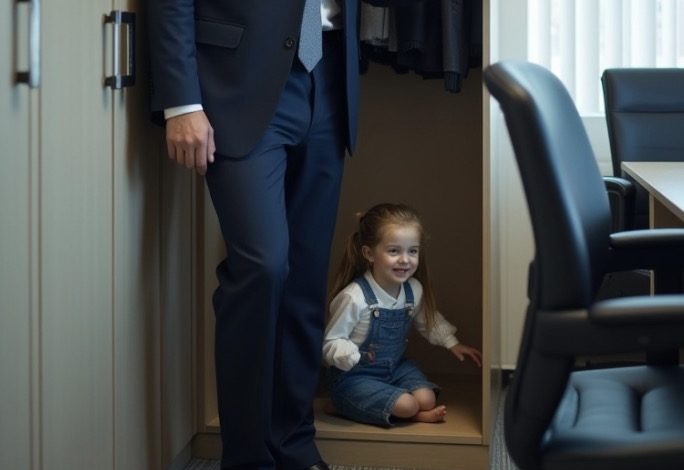He Brought His Little Girl to the Office; a Soft Sneeze Revealed a Hidden Microphone and a Family Betrayal

For the first time ever, Gordon Wallace brought his little girl to the office. For fifteen years, he had run a logistics company with a strict schedule and heavy decisions, yet he was known as a fair boss. He listened, he helped, and he tried to be decent. People at work called him strong. But even strong people can break in a moment.
That morning, his office sounded different. Instead of ringing phones and tense meetings, there were soft giggles and the scratch of crayons. Ava sat at the low coffee table, coloring a dinosaur with great focus, her feet swinging above the carpet.
“Daddy has a short meeting,” Gordon said, kneeling beside her. “It won’t take long. See if you can finish your T-Rex before I’m back.”
Ava nodded. “Okay!”
He kissed her forehead and stepped out.
Twenty minutes later, he returned. The room was quiet. The half-colored page lay on the table; a green crayon had rolled into the edge of the Persian rug. But Ava was not there.
“Ava?” he called, cheerful at first. “Game’s over.”
Silence answered him. He checked behind the curtains, under his desk, even opened the hallway door to ask the receptionist. No one had seen a little girl leave.
“Ava, this isn’t funny,” he said louder, his chest going tight. He took a step toward the closet—and heard a small, delicate sneeze from inside.
Relief washed over him. Hide-and-seek. He smiled, swung open the door.
Ava sat crouched in the corner, clutching her teddy. She was pale and frightened.
“Dad…” Her whisper shook. “A lady came in. She talked about the police. She searched your desk for a long time.”
Gordon’s smile fell away. His face drained of color. He looked under the desk, to the hidden place only he knew. His body froze.
That moment snapped him back to another day—the day everything started to fall apart.
It had begun a month earlier at a business conference on small and medium-sized companies. Gordon had given a talk about managing people. In the third row sat a woman who took notes in a neat, small notebook. After his talk, she came up with a steady handshake and warm palm. “Victoria Andrews,” she said. “I’m a financial investment consultant.”
Something shifted in him. He could not explain it. He had met many smart, beautiful women in his life, but this felt different. With Victoria, time seemed to slow. Her voice held his attention. The faint floral scent she wore stayed with him even after she walked away. He was forty-two, married for fifteen years, the father of a five-year-old girl. He knew better. And yet he felt pulled, the way a magnet pulls a paperclip without asking permission.
They began talking. Then meeting. Then, one morning, he sat on the edge of a hotel bed, looking at a beige wall and hating himself for being there. Victoria lay beside him asleep, blond hair spilled over the pillow, the sheet up to her waist. He dressed with shaking hands, buttoning his shirt while his head pounded and his mouth tasted bitter.
His phone rang. Maria—his wife.
“Hello?” He tried to sound normal.
“Honey… we’re at the hospital,” Maria said, voice breaking. “Ava woke up struggling to breathe. The fever is 104. They say pneumonia. I’m terrified.”
Everything blurred. “I’m coming,” he said. “Right now.” He lied about a meeting and a silent phone and ran.
He reached the children’s ward half an hour later. Maria’s eyes were red. Ava lay under a white blanket with an IV in her small arm, breathing hard.
“The doctors say the antibiotic should help,” Maria said, exhausted. “We’ll be here at least a week.”
Gordon kissed his daughter’s hot forehead and took her hand. “I’m here, sweetheart.”
“Daddy?” Ava whispered. “You came?”
“Always.”
He told them he would stay while Maria went home to rest and bring supplies. When Maria left, Ava asked for a story. He told her about being seven with his brother Daniel at their grandmother’s, and a one-eyed dog named Pirate. He told her how foolish courage and pain can teach a lesson, and how sometimes you have to be brave long enough to get better. She drifted off to sleep with his hand still on her hair.
For a while, he sat and watched her breathe. He felt disgusted with himself. What was he doing risking all of this—this home, this child—for a feeling he didn’t even understand?
His phone buzzed with messages from Victoria. Where are you? You left? Call me. He didn’t answer.
That evening Maria returned with a bag of clothes and a softer face after a shower and a nap. “Thank you for staying,” she said, touching his shoulder. “I can manage now.” He kissed Ava and left.
At home, he poured whiskey to drown out the shame. The phone vibrated: a message from Victoria—This morning was unforgettable. I want more. Then a photo: Victoria on the same hotel bed, the sheet barely covering her, eyes full of promise.
He should have blocked her. He typed instead: Not a good day. My daughter is in the hospital.
Poor thing, she replied almost at once. You need support. I’ll come. Thirty minutes.
He hesitated, then gave in. She arrived. The kiss was immediate. “No words,” she whispered. “Forget everything for one hour.” He did.
For the days that followed, while Maria slept in the hospital chair and read to Ava, Gordon met Victoria in hotels, in his apartment, once in her car at a dark parking lot. He brought his daughter toys and coloring books, brought Maria flowers, and then went back to the affair. He despised himself, but he kept going, like a man walking deeper into a fog because the road behind him is already gone.
A week later, Maria called with joy: “They’re discharging us today!” She asked if he could pick them up. He lied about a meeting with investors and sent the driver instead. The silence on the line said more than words. Work is more important. As always, Maria said, and hung up.
That night, when he finally came home, Maria sat at the table with a small gold earring in her open hand—a pink stone that Gordon knew too well. “I found this in our bed,” she said, voice cold. “In our bed, Gordon.”
The blood left his face. She threw the earring at him. “Are you out of your mind? You brought her here?”
He tried to explain. There was nothing to say.
“Don’t say the word love,” Maria said, shaking. “You don’t know what it means.” She ended it: “I’m filing for divorce.”
What followed was a blur: lawyers, papers, long meetings, dividing property, figuring out custody. Gordon moved to a rented place across town. Maria hired an attorney. So did he. Victoria stayed near him, soft voice and warm hands, telling him not to punish himself. “You have a right to your life,” she would say. He clung to her, because she felt like the only light in a ruined week.
Then, three weeks before the final court date, Victoria stopped answering. Her phone rang and rang. She did not pick up. She did not write back. She vanished.
On the day the judge ended his marriage with one strike of the gavel, Gordon walked out into a gray, wet October afternoon and called her again. Voicemail. He met his friend Stan at a bar.
Gordon told him everything—from the first handshake to the empty ring tone. “She’s gone,” he said. “Just gone.”
“Go to her place,” Stan said.
“I don’t know where she lives,” Gordon realized, stunned by his own words. “She never invited me over. Not once.”
“Where does she work?”
“She told me FinanceGuard.”
“Call them.”
He did. “We have no employee by that name,” the receptionist said. “Not now, not in the last three years.”
Gordon hung up and stared at his glass. “She wasn’t there,” he said to Stan. “Maybe she never was. Maybe I was chosen. Maybe someone sent her.”
“Chosen by who?” Stan asked. “And why?”
“I don’t know,” Gordon said, but cold fear spread in his chest. “I have competitors. Enemies. If someone wanted to ruin me, this would be a way.”
Weeks passed. He tried to find Victoria; everything led nowhere.
Then came the day Maria called asking for a favor. “I can’t move my meeting,” she said, weary. “My mother is sick. Could you pick up Ava from daycare and keep her for the afternoon?”
“Of course,” he said, grateful for a chance to be useful.
He picked Ava up at two, and she ran into his arms. “Daddy!” He carried her to the car and felt the ache of missing her settle into his throat.
“Want to see Daddy’s office?” he asked.
“Yes!”
He showed her the desks and the view and the big chair at his own desk. “Can I spin?” she asked.
“A little,” he laughed. He set out markers and a coloring book. “I have a quick meeting on this floor. Draw here. I’ll be right back.”
The meeting with suppliers took an hour. When he returned, the office looked the same—except for the empty chair.
“Ava?” he said. No answer.
He heard the sneeze. He opened the closet, smiling—then froze. Ava’s face was white; she shook with fear.
“Dad,” she whispered. “A lady came. She talked about the police. She searched your desk for a long time.”
Gordon checked under the desk and saw a tiny black device taped to the underside—a microphone with a blinking red light. A few inches away, a small gold pendant lay on the floor: a heart with the letters V.A. He had given that pendant to Victoria one month after they met.
“Damn,” he whispered. The pieces slid into place. She had been placed in his path. She had his passwords, his papers, his habits. She had everything.
The door opened behind him. Two police officers stepped in. Behind them stood Victoria in a gray suit—cool, distant—and next to her, a man Gordon had not seen in five years: Daniel, his older brother.
“What is this?” Gordon said, standing.
“Gordon Wallace,” an officer said, taking out handcuffs. “You are suspected of large-scale fraud, tax evasion, and forgery. You’re under arrest.”
“That’s impossible,” Gordon protested. “I haven’t done any of that.”
“We have a warrant and evidence,” the officer said.
Cold metal closed around his wrists. He looked at Victoria. Her eyes met his. No apology lived there. No triumph either. Only emptiness.
“Why?” he asked.
She said nothing.
Ava sobbed in the corner. “Daddy!”
“It’s okay, sweetheart,” Gordon said, trying to steady his voice. “This is a mistake.”
Daniel stepped forward with a smile that made Gordon’s stomach turn. “I offered you a fair share of Father’s business,” he said, almost gently. “You chose to hide behind the will. He promised me this firm.”
“Father chose me,” Gordon said. “You didn’t even want it back then.”
“That’s what he thought,” Daniel said with a dry laugh. He pulled out papers. “Your signature on contracts with fake companies. False invoices, forged shipping papers. You’ve been bleeding your own company.”
“These aren’t mine,” Gordon said, shock turning to anger. “Those signatures are forged.”
“Experts will confirm they’re yours,” Daniel replied calmly. “And the audio from the microphone will help, too.”
Gordon looked at Victoria. “You did this?”
Daniel answered for her. “She is a very good actress. She got close enough to learn what she needed and to keep you busy. While you were drowning in your own mess, we prepared this.”
“Why my family?” Gordon asked, voice breaking. “Why hurt Maria and Ava?”
“To make you weak,” Daniel said. “A man with no support fights badly.”
“You’re a monster,” Gordon spat.
“I’m practical,” Daniel said. “It’s business.”
The officers pulled Gordon toward the door. Ava ran forward, crying for him; an employee rushed in and took her gently to the side. “Call Maria,” an officer said.
“I love you,” Gordon told his daughter. “I’ll fix this.”
They took him to the station. There were questions, forms, long hours under bright lights. He asked for a lawyer. He said the records were false. The process did not stop.
Two months later, in court, Daniel’s team presented a smooth chain of “proof”: documents, signatures, recordings, accounts. Gordon’s lawyer, Victor Peterson, argued forgery, but every door seemed to close. The verdict came down: seven years in a general-regime prison.
Daniel took control of the firm. Victoria disappeared from public view as neatly as she had arrived.
On Gordon’s last day in the city before transfer, he got a short visit through glass. Maria sat with Ava, holding the receiver. Ava’s eyes were swollen from crying.
“Mom says you’ll be gone a long time,” she said softly.
“I have to go for now,” Gordon answered, voice steadying. “But I will come back. I will prove I didn’t do this.”
Maria looked at him without anger for the first time in months—only tired confusion. “I don’t know what to believe,” she said. “But Ava needs a father. If you can clear your name, do it.”
The guard tapped the clock. Time was up. Gordon pressed his hand to the glass; Ava pressed hers to match. Then he was led back to his cell and sent away the next morning.
Life inside was gray and narrow. He worked in the shop, kept his head down, and read the law books Victor sent. He wrote notes to himself each night: timelines, names, details—anything that could later matter. He remembered every meeting with Victoria, every time she reached for his phone, every moment when she guided him just one step to the side. He replayed the day she searched his office, the pendant on the floor, the blinking red light under the desk. He listed the contracts Daniel had shown, the shell companies, the invoices. He noted that Daniel had never lifted a finger for the business until now. And he wrote a line that he repeated like a prayer: I will not let this be the end.
Back at the office in the present, holding the pendant and staring at the hidden microphone, he knew one thing with perfect clarity—this had not been an accident. It had been a plan. He did not know how he would undo it yet. But he would try.
For now, though, the officers took him away, Ava cried in the doorway, and the quiet hum of the company he had built went on without him.
And somewhere between the door closing and the siren starting, the strongest man in the room finally broke—not with a shout, but with a promise to himself that he would stand again.










